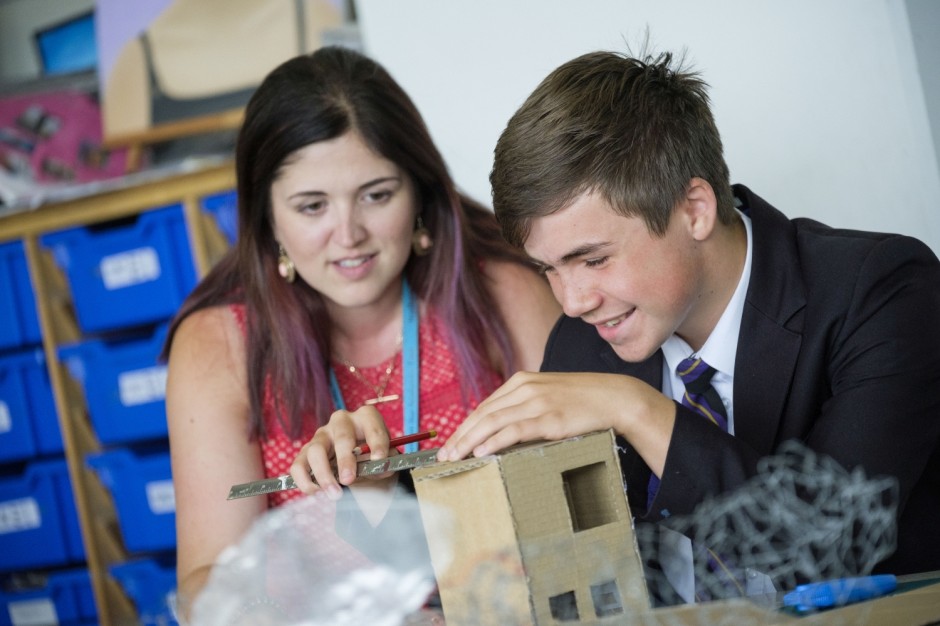More in this section...
Welcome to the Design Technology Department

Design and Technology in schools develops young children's skills and knowledge in design, structures, mechanisms, electrical control, and a range of materials, including food. Design and Technology develops children's creativity, independence and encourages them to think about important issues.
In the Harrogate High School Design Technology Department, we believe in giving young people the skills, independence, and understanding to engage with the design world. We aim to harness an interest, and build skills in designing, creating, improving, and evaluating so students can succeed in projects and in their future.
We aim to create:
- Successful learners who work independently to make good progress and have high aspirations.
- Inquisitive learners who explore the design world to creative inventive ideas to design problems.
- Learners who work safely, whilst taking risks to learn from their mistakes, enhancing their own skills.
Curriculum Intent
In Design Technology we believe that students learn best by ‘doing’ and by allowing them to experiment and take risks, in a safe and positive learning environment. We aim to achieve this through imaginative teaching that embraces new technologies and resembles modern industrial processes, whilst retaining the best of traditional practices.
At the heart of this, we strive to deliver a curriculum in which students produce high quality outcomes within their specialism area of Food, Product Design or Textiles, while embedding the importance of social and ethical responsibilities of designers and engineers and the importance of managing finite resources with care. We aim to develop technical and practical abilities across the 3 material areas, as well as wider skills valued by employers.
We deliver a D&T curriculum that provides a range of opportunities for all students to access a breadth of topics and material disciplines. The curriculum allows students to become self-motivated and confident learners, who can work independently and as part of a team. Our main priority is for students to be problem solvers who are not afraid of making mistakes and who understand the importance of learning from perceived failures.
How Design Technology links to our CARES Values
Courage
Students are challenged to take risks and work outside of their comfort zone to challenge design boundaries, develop knowledge of equipment, and open their eyes to the use of new and modern materials to create successful outcomes.
Aspiration
In all areas of Design Technology students are shown real world examples of jobs and opportunities that they can aspire towards.
Respect
Students must respect each other, and the tools and equipment used in Design Technology to be safe and successful when working as a team.
Equality
All students are given equal opportunities to create a range of projects with a flare of their own individuality, with this they can also bring their elements of difficult religions and cultures and life experiences.
Self-control
Students will have to overcome new challenges with Design Technology but through self-control they will be able to overcome these issues and maintain their composure to create outstanding outcomes.
How Design Technology links to British Values
Democracy
Students must listen to the views and opinions of others but still have the right to make their own choices.
The Rule of Law
Students must understand the importance of safety rules when using tools and accept that if these rules are not followed that there are consequences to this.
Individual liberty
Students need to understand that they should listen to others but can use their own ideas and design choices when designing and making. They should also accept that other’s ideas may not be the same as their own and accept this.
Tolerance
Students should tolerate ideas from others that are different to their own and understand that many great design ideas originate from other cultures and be respectful of this. Students will be challenge on unacceptable views when discussing the cultural impact on Design Technology and the Prevent strategies used when concerns are raised.
Mutual Respect
Students should listen to and consider the ideas and opinions of others even if they differ from your own and offer supportive comments in evaluations that will improve learning outcomes in a way that is objective but sensitive to others.
Subject Staffing
Head of Department - Miss L ReedTeacher of DT - Miss D Reid
Teacher of DT - Ms L Day
Teacher of DT - Miss S MetcalfeTeacher of DT - Mrs H Ashton-Braithwaite
Teacher of DT - Miss S Ainsley
Facilities
- Workshop
- Teaching Kitchen/Bistro
- Textiles Lab
- CAD/CAM Laser cutter
Key Stage 3 Overview
Course title: KS3 Design & Technology
Key Areas of Study:
- Textiles
- Food
- Product Design
Assessment: Creating a portfolio of work based on; researching, designing, manufacturing and then evaluating a product(s)
Course Length: 3 Years
- 3 x 11 weeks per module in Year 7
- 3 x 11 Weeks per Module in Year 8
- 3 x 11 Weeks per Module in Year 9
Course Overview
Y7 Modules:
- Timber lock box design and make project with a focus on tools and timbers
- Healthy Eating with a focus on the Eat Well Guide and basic kitchen skills.
- Personlised Cushion design and make project with a focus on natural fibres, hand and machine sewing.
Y8 Modules:
- Childrens Night Light design and make project with a focus on plastics & CAD/CAM.
- World Foods with a focus on food safety and the storage and use of raw meat.
- Tie dye tote bag design and make project with a focus on synthetic fibres, tie dye, screen printing and shaping.
Y9 Modules:
- Personalised desk tidy design and make project with a focus on independence, and creativity.
- Food from scratch module with a focus on nutrients.
- Electronics Stand design and make project with a focus on synthetic fibres, batik, independence, and creativity.
Progression to:
Key Stage 4 Overview
We offer AQA GCSE Design Technology with a Textiles or Resistant Materials focus, alongside WJEC Level 1/2 in Hospitality and Catering. All KS4 courses are a combination of an external exam and internal controlled assessment
AQA GCSE Materials
This GCSE prepares students to understand an increasingly technological world. Students gain awareness and learn from wider influences on Design and Technology including historical, social, cultural, and environmental factors. Students will get the opportunity to work creatively when designing and making and gain the ability to apply technical and practical expertise to their projects. Students internal controlled assessment is based around developing a comprehensive portfolio of work focused on; researching, designing, manufacturing and then evaluating a products(s)/outcomes. During the GCSE students will study core technical information and designing and making principles, including a broad range of design processes, materials techniques, and equipment. They also have the opportunity to study a specialist technical principle in greater depth.
Exam Paper (end of two year course)
What is assessed:
- Core technical principles
- Specialist technical principles
- Designing and making principles
How it is assessed:
- Written exam: 2 hours
- 100 marks
- 50% of GCSE
Questions:
- Section A – Core technical principles (20 marks) A mixture of multiple choice and short answer questions assessing a breadth of technical knowledge and understanding.
- Section B – Specialist technical principles (30 marks) Several short answer questions (2–5 marks) and one extended response to assess a more in-depth knowledge of technical principles.
- Section C – Designing and making principles (50 marks) A mixture of short answer and extended response
Non-exam assessment
Practical application of:
- Core technical principles
- Specialist technical principles
- Designing and making principles
How it is assessed:
- Non-exam assessment (NEA): 30–35 hours approx.
- Substantial design and make task.
- 100 marks
- 50% of GCSE
Assessment criteria:
- Identifying and investigating design possibilities
- Producing a design brief and specification
- Generating design ideas
- Developing design ideas
- Realising design ideas
- Analysing & evaluating
Students will produce a prototype and a portfolio of evidence. Work will be marked by teachers and moderated by AQA
WJEC Level ½ Hospitality and Catering
The WJEC Level 1/2 Vocational Award in Hospitality and Catering is made up of two mandatory units:
Unit 1 The Hospitality and Catering Industry Exam (End of the two-year course)
- This is an on-screen exam.
- Duration: 90 minutes
- Number of marks: 90
- Short and extended answer questions based around applied situations. Learners will be required to use stimulus material presented in different formats to respond to questions.
For this unit learners use their knowledge and understanding of the hospitality and catering industry to propose new hospitality and catering provision to meet specific needs.
Unit 2 Hospitality and Catering in Action (Assessment takes place mid-way through year 11)
- Internal controlled assessment
- Students are to plan four and create 2 recipes for a specific setting.
- Duration: 9 Hours over 2 days.
In unit 2 learners apply their learning to safely plan, prepare, cook, and present nutritional dishes for a specific setting. This unit is internally assessed and externally moderated. All assessments must be conducted under controlled assessment conditions in school.











